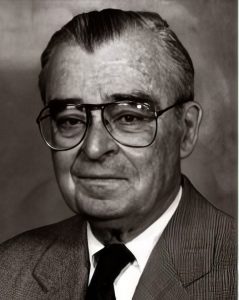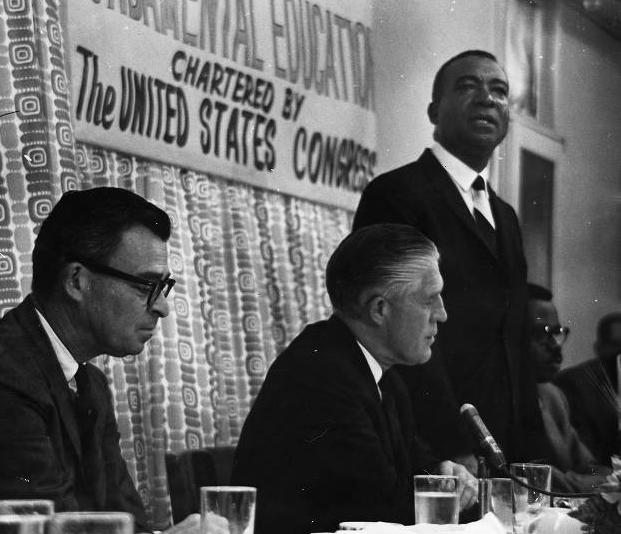
Photo info ...
Credit: Indiana Journalism Hall of FameView Source
(Sept. 7, 1914-Jan. 20, 1999). Eugene S. Pulliam was born into the newspaper business. His father was editor and publisher of the at the time of his birth. Pulliam moved from Atchison to Franklin, Indiana, when his father sold the and purchased the .

Pulliam’s mother Myrta died in 1917, and his father soon remarried, in 1919. Martha Ott Pulliam was the mother of Pulliam’s two half-sisters, Martha Corrine (the mother of Vice President Dan Quayle) and Helen Suzanne. In 1923, Pulliam’s father acquired the , located in the county seat of Boone County. His father would eventually divorce Ott and marry , who also became a force in the family media business.
During his youth, Pulliam delivered the and served as an apprentice on the paper. He attended DePauw University, graduating with a degree in history in 1935. At DePauw, he followed in his father’s footsteps editing the student-run newspaper and serving as president of Sigma Delta Chi (later renamed the Society of Professional Journalists), both of which his father had founded when he had been a student at the Greencastle liberal arts college.
Following graduation, Pulliam began his career in journalism working for the United Press news service in Chicago, Detroit, and Buffalo, New York. In 1934, his father established Central Newpapers, Inc., as a holding company for his publishing interests, eventually acquiring 46 newspapers including the , the , the , and the , in addition to the and . Pulliam moved to Indianapolis in 1938 to become news director of , which his father also owned.
Pulliam married Jane (Bleeker) Pulliam in 1943, and the couple had three children, Myrta, Deborah, and Russell. Myrta and Russell would follow their father into the family business.
During World War II, Pulliam served in the U.S. Navy and U.S. Naval Reserve. When he left service in 1944, he served as aviation editor, assistant city editor, and city editor at the . He became managing editor of the , in 1949. Pulliam and his father dominated the news coverage in the city and state for the second half of the 20th century.
Pulliam was a news reporter at heart, writing stories about other people. He teamed up with his father, who had circled the globe in post-World War II reporting and became a strong opponent of socialism and communism. Like his father he was a strong advocate of freedom of the press. They, however, differed in temperament. Eugene C. Pulliam came from another newspaper era and trumpeted his political preferences in front-page editorials. Eugene S. was less of a crusader and more an impartial news editor.
Although known primarily as a leader in delivering the daily news, Eugene S. Pulliam also went behind the scenes to help take Indianapolis from minor to major league status. The city image was “India-no-place” or “naptown” in the 1950s and 1960s. In the early 1950s, as managing editor of the , Pulliam helped lay seeds of progress. He was one of the early Indianapolis civic leaders who proposed the annexation of the county into the city. A young Republican mayor, , made it happen 20 years later.
Through a initiative Pulliam helped boost African American homeownership through a sweat equity program, with new homeowners helping to build their homes for the down payment. He also was a founder of Crooked Stick Golf Club, which later put the city on the map in attracting national pro tournaments.
After serving as managing editor of the News, he became assistant publisher of the morning and evening in 1963. When his father died in 1975, he took the role of publisher, a position held until his death. Pulliam, as publisher, was known to be budget conscious, scrutinizing all aspects of the newspapers’ finances carefully.
Pulliam also took primary roles at Central Newspapers holding company. He was executive vice president following his father’s death and became president following the retirement of his stepmother, Nina Mason Pulliam, in 1979. A year earlier, he also had become president of Phoenix Newspapers, Inc. and publisher of the and .
Behind the scenes, Pulliam collaborated with a handful of civic entrepreneurs, banker and business leaders such as and . Others joined informal gatherings, such as Jim Morris, a deputy mayor who later ran Lilly Endowment, Inc., and state Rep. . They might find common ground in the need for a downtown state park, a new baseball stadium, or a downtown mall. For those projects, they set aside differences in political party or ideology.
Although the and the often were criticized for being too conservative, Pulliam tried to steer an independent course. Pulliam knew corruption had hurt other bigger cities. He kept aggressive investigative reporting units at both newspapers. reporters uncovered police corruption in Mayor Lugar’s second term, winning a Pulitzer Prize and dooming Lugar to lose his first U.S. Senate campaign. Some civic friends felt that negative news coverage would hurt the city’s image. During his tenure as publisher, the Star won another Pulitzer Prize in 1991, this time for an investigative series on medical malpractice in Indiana (See ).
Pulliam received many honors and awards. He was inducted into DePauw University’s Media Hall of Fame in 1995 and the Indiana Journalism Hall of Fame in 1997. He was awarded the Hoosier Press Association’s First Freedom Award in 1995. The Society of Professional Journalists (formerly Sigma Delta Chi) established the Eugene S. Pulliam First Amendment Award, which it gives annually to groups or individuals who champion First Amendment rights. At Butler University, the school of journalism is named in his honor. The Pulliam name is also attached to the DePauw University Center for Contemporary Media, and a visiting professorship is named in Pulliam’s honor. Ball State University annually holds the Eugene S. Pulliam National Journalism Writing Award competition, and the Hoosier State Press Association maintains the Eugene S. Pulliam Internship Program to provide paid internships for undergraduate students from Indiana or attending Indiana colleges and universities at Indiana newspapers.

Help improve this entry
Contribute information, offer corrections, suggest images.
You can also recommend new entries related to this topic.